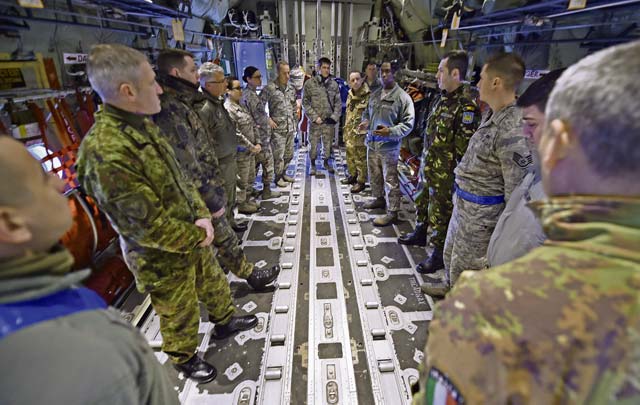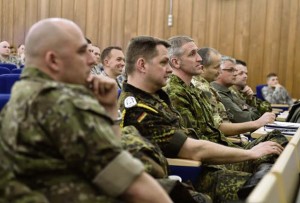
Enlisted leaders from air forces throughout Europe visited Ramstein Feb. 23 to 27 to attend the Kaiserslautern Military Community First Sergeant Council’s First Sergeant Symposium along with 120 Airmen from around the KMC.
Chief master sergeant equivalents and one first sergeant from seven nations, including chief master sergeants of the Estonian, Romanian and Slovak air forces, attended the four-day symposium, which focused on giving technical and master sergeants a true image of a first sergeant’s duties.
For the international visitors, it was an up-close look at a position most of their air forces don’t yet have.

During the annual event, a variety of topics were covered, including how to handle physical fitness, financial, domestic violence and legal issues within a unit.
There was also a first sergeants’ panel where attendees had the opportunity to ask seasoned first sergeants questions and a chiefs’ panel to provide a perspective on life after first sergeant duty.
“The symposium allows (the attendees) to see what we actually do,” said Master Sgt. Zamanta Triche, the 721st Aircraft Maintenance Squadron first sergeant. “Most people just know that the first sergeant will fix it. They don’t see all the stuff we might do in the background, but this event gives them the opportunity to get a realistic look at how we do it.”
Although this is only the second year for the informative symposium, the chief master sergeant of the Estonian air force, or Staabiveebel Janis Jallai, was able to attend once again.
“Returning for the second time has given me a much clearer vision and understanding of the first sergeant position and how it benefits people,” Jallai said. “The Estonian air force does not actually have the first sergeant position, so after everything I’ve learned here I feel it could be a very good tool for us.”
Jallai is not only the chief master sergeant of the Estonian air force, he is also the first one. Coming to a symposium like this allows him to absorb the lessons he’s learned to possibly implement them in his own service.
Before the symposium, the group of chiefs visited and learned about work centers, like the 24th Intelligence Squadron, to get an idea of the types of responsibilities Airmen in the U.S. Air Force perform every day, as well as the Airman leadership school and NCO academy to better understand how Airmen develop through professional military education.
“I think (an experience) like this is a give and take,” Triche said. “At first I was thinking we just had the opportunity to showcase what we do here in the U.S. Air Force and our roles as first sergeants, but now I realize that I’m learning a lot more from them than I could ever teach them.”
After experiencing an event like this and learning not only from the first sergeants and chiefs, but also from his fellow classmates, Jallai said one of the main lessons he would like to take back with him is the importance of taking care of people.
“I would really like to implement more training on personnel issues,” Jallai said. “I would like to see my NCOs gain more knowledge on counseling techniques and practices. I know that my NCOs may not have the right tools, so I would love to enable them to learn more about dealing with personnel issues. I would also like to implement family care plans because it’s not something we do, but I see the enormous benefit in it.”
There are currently over 300,000 Airmen serving in the U.S. Air Force. The Estonian air force is growing and now has over 350 airmen.
Jallai explained that although their air force is small and they don’t have the first sergeant
position, they do have a position that is similar. When he returns, he’s going to mesh some of the aspects he said he liked with the position that already exists to fit what his air force needs.
Next year, the first sergeants hope to open the event to even more people to enlighten future first sergeants and invite enlisted leaders from allied nation’s back.
“I would love to have some of my guys be able to attend this next year,” Jallai said. “I’m amazed by the attitudes of the first sergeants. It’s clear how deeply they go and how much emotion they put into their work and people, and I would like for my people to experience that.”


